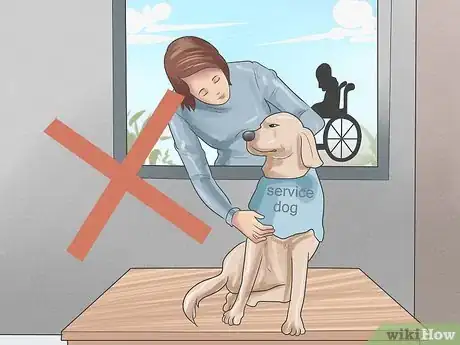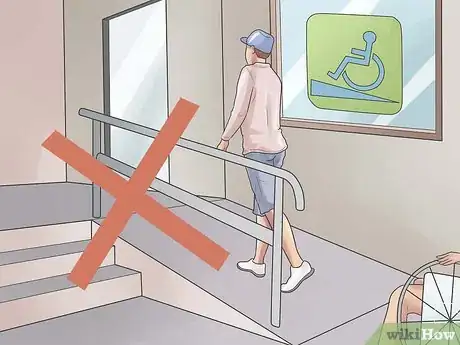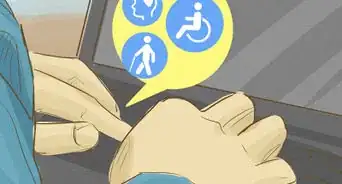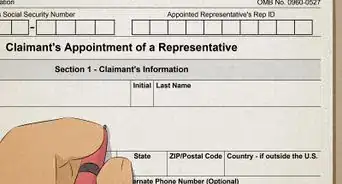This article was co-authored by Meredith Brinster, PhD. Meredith Brinster serves as a Pediatric Developmental Psychologist in the Dell Children’s Developmental and Behavioral Pediatrics Program and as a Clinical Assistant Professor in the Department of Psychiatry and Behavioral Sciences at Dell Medical School of The University of Texas at Austin. With over five years of experience, Dr. Brinster specializes in evaluating children and adolescents with developmental, behavioral, and academic concerns, including autism spectrum disorder, developmental delay, intellectual disability, anxiety, attention problems, and learning disabilities. Her current research focuses on early biomarkers of autism spectrum disorder, as well as improving access to care. Dr. Brinster received her BA in Psychological and Brain Sciences from Johns Hopkins University and her doctorate in Educational Psychology from the University of Texas at Austin. She completed her clinical internship in pediatric and child psychology at the University of Miami Medical School and Mailman Center for Child Development. She is a member of the Society for Research in Child Development (SRCD) and the American Psychological Association (APA).
wikiHow marks an article as reader-approved once it receives enough positive feedback. In this case, several readers have written to tell us that this article was helpful to them, earning it our reader-approved status.
This article has been viewed 75,139 times.
Today, disabled people are often treated with disrespect. This is mostly due to non-disabled people not fully understanding how to treat them with the respect they deserve. Learning the proper way to act and speak around someone with a disability may not be as intuitive as you may think. Oftentimes, there are ways of speaking and behaving which may be very disrespectful to the person with a disability, causing them annoyance, anger, or frustration. Rather than possibly causing a problem, learn the best way to act and talk, so as to respect people with disabilities.
Steps
Acting Appropriately
-
1Ask before helping out. One of the first responses of many people when they see or meet a disabled person is to try to give them help. While this gesture may seem kind, you could actually be irritating them or getting in their way. Ask if they need you to perform a certain task.
- "Would you like me to push your wheelchair?"
- "Do you need help walking?"
- "Would you like me to guide you?" (to a blind person)
- "Should I move this chair out of your way?"
- Let the person tell you what they need instead of automatically assuming what they need in the moment.[1]
-
2Avoid petting or playing with a service dog. It's tough to just pass by when an adorable service dog goes wandering your way. No matter how tempting it might be though, you should never run up and play with or pet a service dog without asking.
- Service dogs perform important jobs, which you distract them from if you run up and start rubbing them between the ears. If you see a service dog, always ask permission from their owner before assuming you can pet them.
- If they agree to letting you pet them, try not to take up too much time doing so. If the owner declines your request, don't take it personally - their dog is an important tool to them, which they may be needing at that time.
- Don't give a treat to a service dog unless the owner approves it.
- Don't let your own dog play with a service dog if you walk past one outside.
Advertisement -
3Don't use disabled services if you're not disabled.
- Having extra space in the bathroom might seem like a great opportunity to take advantage of, but if you're not disabled, others using these services can be very disrespectful and frustrating. People with disabilities truly need these things; it may not be comfortable, to use the smaller bathroom compartment but they might need the extra space for a wheelchair, or they might have a service dog they need room for.
- Regardless of the reason, such features and services are put in place for the specific reason of helping those who are disabled. By using one of those services in such a way that others are blocked from using them, you are potentially depriving a truly deserving person of a service they really need.
- Some restaurants have designated accessible tables/seating arrangements; even if you have a large group, avoid using these.
- When parking next to a designated accessible parking space, give a little extra space on that side if you can. They may need a little space to get in and out with a wheelchair.[2]
- Not all disabilities are visible; don't call someone out for using a disabled service just because they don't look disabled to you.
-
4Don't lean on or play with a person's wheelchair. Nearly anything with wheels is fun to push around; but doing so with a person's wheelchair can be obnoxious and harmful.
- Regardless of whether it is a stranger of a friend, you should not touch a person's wheelchair unless they give you permission or ask you to. This is particularly true if you're leaning on it as an armrest, or pushing it around for fun.
- This same rule applies to anyone using an electric scooter, crutches or any other device necessary for aiding in movement.
- Don't make comments about racing wheelchairs or how amazed you are that they can use it well. It may be new to you, but it's everyday life to them, and it's rude to make flippant remarks.
Speaking Appropriately
-
1Always speak directly to the person, not to their assistant, translator, or interpreter. The same way that you don't want someone talking to you through your parents or friends, it is annoying for a person with a disability to be spoken to through their assistant.
- If you're asking a question or having a conversation with a person who has a disability, always speak directly to them. This might seem particularly tricky in the case of someone who has a translator, but keep your gaze and words directed at the person.
-
2Allow the person you're speaking with to set the pace of your conversation. If they have a cognitive disability or speech impediment, they may speak differently.
- It's important that you let them set the pace of the conversation. Trying to speak too quickly or finishing their sentences for them can be very frustrating. Even if it means you have to wait several minutes to listen to what they have to say, it is much more appropriate not to rush.
- They'll appreciate your listening skills and the time you take to hear them out.
-
3Don't talk down to them. It's a common cliché for people to speak to a person with a disability like they're a child or like they don't understand you. Most disabilities don't alter someone's ability to understand a conversation, but they may slow their speech or response time.
- Don't use childish pet names or raise your voice when you're talking to someone with a disability. Always use your regular vocabulary (not a limited vocab) and your regular speaking voice (not shouting). They'll appreciate you acting normal around them, and respond much more pleasantly.
- Only limit your vocabulary if you notice them using a limited vocabulary.
-
4Don't focus on pity in your conversation. If your entire conversation consists of comments like 'I'm so sorry you have to deal with that' and 'You must have a very difficult life', it is pretty certain that the person you're talking to will get annoyed.
- Although you may say these things with good intentions, it insinuates that they are sub-par and live horrible lives.
- Similarly, avoid making patronizing remarks and backhanded compliments like "You're quite successful for someone in a wheelchair" or "I've never met someone who is so stylish and blind". These remarks are completely disrespectful , won't be received positively, and will only frustrate the person you're talking to.
-
5Use non-offensive terms and avoid derogatory statements/names. Some names and phrases have been so overused in our culture that they no longer seem offensive to say. However, this does not mean that the disabled person won't take them personally; after all, it's comparing something bad to people like them. Whether you're speaking to a disabled person or not, avoid using these names and descriptors:
- Handicapped
- Crippled
- Retarded
- Crazy
- Insane
- Deformed
- Dumb
- Mute
- Midget
- Moron
- Hearing-impaired -- "Deaf" and "Hard of Hearing" are the terms most Deaf people choose to identify themselves, even though the medical community prefers the former term. The only time someone should be referred to as hearing-impaired is if they choose to identify themself in that way.
- Always ask the person about what kind of terminology they prefer instead of assuming one way or the other.[3]
-
6Don't be patronizing. Some disability-related "tips" are actually annoying to disabled people. Here are some things that annoy them:
- Do not bend down to talk to someone in a wheelchair. This can be considered patronizing, because usually only children are treated this way.
- Don't automatically start describing everything to a blind person or start trying to finger-spell your sentences to a Deaf person. You may not actually be helping. Ask first.
- Don't try to perform therapy on an autistic or mentally ill person. They get enough of that already, and your knowledge of therapy techniques may be lacking.
-
7Don't be afraid to ask questions. Making assumptions is a great way to get yourself into trouble; oftentimes, assumptions are wrong and can lead to stereotypes and offensive comments.[4]
- Many disabled people would rather you ask about their condition or the way they want to be treated, rather than just assuming you know.
- At the end of the day, everyone has their own individual way of perceiving their disability.[5]
- Keep in mind though, that your questions should remain appropriate and non-judgmental, rather than nosey and intrusive. If they don't want to answer your questions, don't take it offensively.
- Disability can be personal, and they may not want to talk about it with a stranger.[6]
Understanding
-
1Know that disabled people are almost always used to their disability. They do not view themselves as inspiring or courageous for simply existing. They are probably not suffering. Just as you adjust to your hatred of spicy foods or carsickness, they have adjusted to their disability.
- It's okay to say "I heard that you wanted to buy a cat" or "Let's take a walk." It won't bother them.
- If they have not adjusted to their disability, they may be newly disabled, still be experimenting, or be experiencing depression.
-
2Be aware that some disabilities are invisible. Just because someone "looks normal" does not mean that their disability isn't real or important.
- Not all people who need disabled parking spaces use mobility devices.
- People can be depressed while appearing happy, chronically ill while appearing healthy, or autistic while being able to interact typically.
-
3Let them be themselves. Some disabled people behave differently. Even if you don't understand why they are doing what they are doing, assume it is important, and let it be. It may be an important coping mechanism, or something out of their control. Here are some things that disabled people might do:
- Stim (rocking, flapping hands, fidgeting, etc.)
- Bounce around
- Tic (twitching, blinking, making sounds)
- Pace
- Not make eye contact or look at you when talking
- Echo words or phrases
-
4Don't grade disabled people or invalidate their experiences. Their level of disability does not define them or prevent them from understanding their needs and disability.
- It's very disrespectful to try to fit someone into labels of "high-functioning" or "low-functioning. Those labelled as "High-functioning" often don't receive the accommodations support they need. On the other hand, those labelled as "Low-functioning" are seen as incapable, and others often fail to see their strengths. [7]
- Don't tell them that they are too disabled or not disabled enough to understand what disabled people need. That is completely disrespectful.
-
5Know that disabilities can be more severe on some days than on others. They can waver based on the person's energy level, the weather, what they did today, their general health, and many other things. Just because someone can or can't do something today doesn't mean it'll be the same tomorrow.
- Wheelchair users may be able to walk short distances, or may even be able to go without wheelchairs some days.
- Autistic people may be able to enjoy hugging one day, and be unable to handle it the next day.
- When in doubt, ask.
Warnings
- Watch the sources that you use. Some information about disability may be inaccurate at best and dehumanizing at worst.⧼thumbs_response⧽
References
- ↑ Meredith Brinster, PhD. Licensed Clinical Psychologist. Expert Interview. 23 July 2021.
- ↑ http://www.oprah.com/spirit/Respect-the-Disabled-Every-Monday-Matters
- ↑ Meredith Brinster, PhD. Licensed Clinical Psychologist. Expert Interview. 23 July 2021.
- ↑ Meredith Brinster, PhD. Licensed Clinical Psychologist. Expert Interview. 23 July 2021.
- ↑ Meredith Brinster, PhD. Licensed Clinical Psychologist. Expert Interview. 23 July 2021.
- ↑ http://www.dhs.state.il.us/page.aspx?item=32276
- ↑ http://autismwomensnetwork.org/whats-the-difference-between-high-functioning-and-low-functioning-autism/














































































